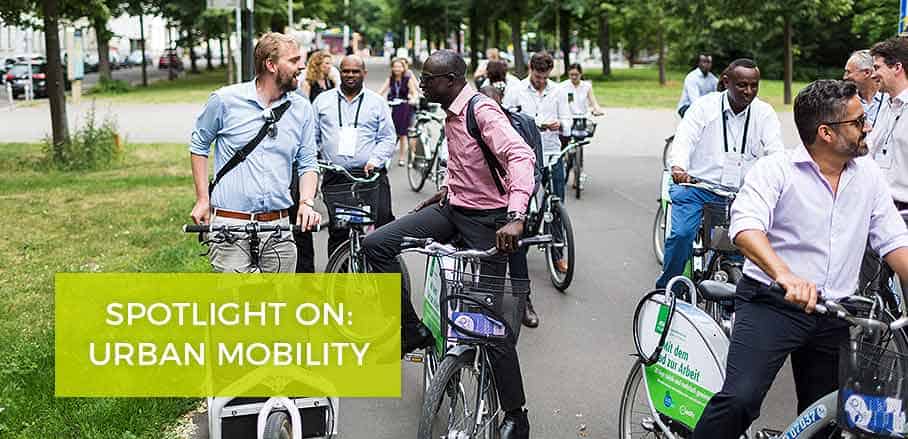“Transport as usual is not an option”
By Mathias Merforth and Sophia Sünder
More than 80 transport practitioners engaged in TUMI Conference on Urban Mobility Governance in Leipzig, Germany at the side of the International Transport Summit 2017.
Whether in Addis Ababa, Leipzig or in Kaohsiung – sound transport governance plays a key role in improving the liveability of cities and mitigating climate change. More than 80 transport officials engaged in a conference run by the Transformative Urban Mobility Initiative (TUMI) along the International Transport Summit 2017 in Leipzig, Germany for two days, highlighting the relevance and the potential of stronger collaboration on urban mobility governance in African Cities.
“Transport as usual is not an option,” said Dr. Tania Rödiger-Vorwerk, Deputy Director General for Strategy and Policy Planning of BMZ, in her opening address. Inadequate infrastructure and services hinder economic development of cities and countries around the world every day. Africa alone loses 2 percent of its economic potential each year. While trying to enhance quality, safety and affordability of sustainable mobility options for their citizens, transport officials are often confronted with the need to think out of the box and to create wide coalitions, even with initially opposing stakeholders.
During the conference, urban planners and creative minds from throughout Sub-Saharan Africa explored municipal transport governance, and brought contrary and joint views of challenges and solutions as well as findings from up-to-date research to one table. Following the TUT-POL[1]Transforming Urban Transport – The Role of Political Leadership framework of Harvard University, the participants took up the perspectives of fellow planners on urban development and mobility governance and won insights as well as entry points for their local mobility challenges.
Many ambitious mobility projects are in preparation in Sub-Saharan cities – Addis Ababa, Dar es Salaam or Cape Town have already proven the potential for urban transformation through bus rapid transit, light rail systems and non-motorised transport infrastructure. Many more exciting projects are at the drawer and wait for implementation. To succeed, mobility projects need to be well framed within local policies and citizen needs. They must include the right stakeholders, and technical and political capacity for transport built up must be ensured. Thus, the need for strong political leadership and institutions was highlighted as key for sustainable infrastructure solutions during the conference.
The event took place under the umbrella of the Transformative Urban Mobility Initiative (TUMI). The ambitious initiative was launched at HABITAT III in Quito in October 2016 with its partners the Asian Development Bank (ADB), C40 Cities Climate Leadership Group, Development Bank of Latin America (CAF), the German Federal Ministry for Economic Cooperation and Development (BMZ), ICLEI, the Institute for Transportation & Development Policy (ITDP), Deutsche Gesellschaft für internationale Zusammenarbeit (GIZ), the Kreditanstalt für Wiederaufbau (KfW), Partnership on Sustainable Low Carbon Transport (SLoCaT), UN-Habitat and the World Resources Institute (WRI). TUMI combines the expertise and knowledge of all its partners and supports cities in developing countries and emerging economies in implementing sustainable urban mobility projects.
Here you can find visual impressions from the Practitioners’ Conference.
More information can be found on transformative-mobility.org.
